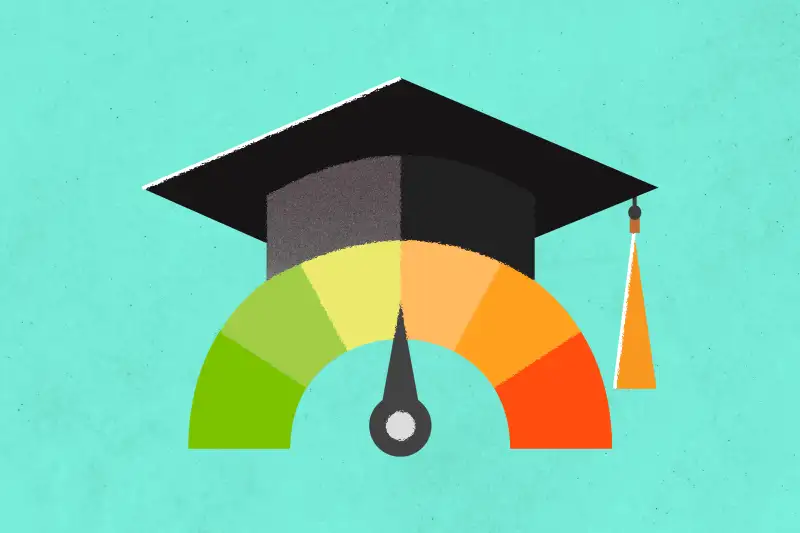Does Student Loan Debt Affect Your Credit Score?

If you’re one of the roughly 44 million Americans who have student loan debt, there’s a strong chance that student loans were your first brush with credit.
With the cost of tuition tripling over the last two decades, an increasing number of college students have resorted to loans as a way to fill the financial gap when scholarships and grants are not enough. But loans can have ripple effects that last long after your college years end. For one, both federal and private student loans can make or break your credit, which determines your ability to borrow money in the future.
“When you leave school, if you don’t pay close attention to your payments it can backfire,” Donna Loitz, a credit and student loan counselor at American Financial Solutions, says. “However (student loans are) also an opportunity to establish credit almost instantly.”
How do student loans help and how can they hurt? Here’s a breakdown.
How student loans affect your credit while in school
While you’re not required to make any payments on your student loans until after you graduate, both federal and private student loans will show up on your credit report as soon as you’re approved for the loan.
The only exception to this rule is parent PLUS loans, which will show up on one of your parent’s credit reports since the loans — even though they pay for your education — were taken under your parent’s name.
But just appearing on your credit report isn’t necessarily bad. When you’re in school, your loans are automatically put in a deferred payment status. Rod Griffin, senior director of public education and advocacy at credit bureau Experian, says that this means they’re in a “dormant” state and “have little-to-no effect” on your credit score. So they’ll be on your official credit report, but they won’t lower or raise your credit score because they aren’t in active repayment.
Of course, even if the loans don’t impact your credit score during your college years, not paying your loans while you’re enrolled can have long-lasting effects on your finances, as interest will accrue on federal unsubsidized and private loans. Eventually, that interest capitalizes and becomes part of your principal balance.
Three ways student loans can benefit your credit
Student loans are a type of installment debt, meaning that you borrow a fixed amount in one lump sum, and then you typically repay it on a monthly basis for a specified number of years.
So paying your student loans on time can help you improve your credit the same way paying other installment loans, like a mortgage or an auto loan, would.
“Once they're in repayment, they're essentially just like any other loan in terms of how they affect your payment history,” Griffin says. “So, it's really important to treat them that way.”
Paying your loans diligently helps three aspects of your credit: payment history, credit mix and credit length.
The biggest way student loans can boost your score is by helping you establish a positive payment history. That accounts for 35% of your credit score, according to FICO, so if you pay your loans like clockwork, you’ll see your credit score improve substantially.
Credit length measures how long you’ve had those accounts and makes up 15% of your score. In the case of student loans, your credit length is established from the minute you’re approved for the loan, even if you’re not paying it. That's why they can be especially helpful for younger students, who may be years away from a mortgage or who are trying to avoid credit card debt.
The credit length measure is also why some people believe that paying off their student loans early will hurt their credit. But that's not true — your loans will stay on your report for a period of time.
“When you pay off a loan early, it isn’t really reflected in the report, other than to show that it's paid in full and as agreed, and that's always positive,” Griffin says. “They'll stay for 10 years from the date that they're paid, so you're going to keep that positive history,” he adds.
Finally, credit mix is the different types of credit you have under your name, and it accounts for or 10% of your credit score. If you have student loans and a credit card, for example, this could help you improve your credit, since you’d have two types of loans. Just note that you don’t want to have an excessive number of accounts.
Late or missed payments can hurt your credit score
Just as on-time payments can bolster your credit, paying your loans late or missing a payment can sink it. But don't freak out if you happen to miss a single payment by a couple of weeks. As long as you pay it and catch up before 90 days, it likely won't be reported to the credit bureaus.
If you’re more than 90 days late and it is reported to the credit bureaus, this will remain on your credit report for seven years, Griffin says. Same thing if you default on the loan.
It’s important to highlight that each loan you took while in school may appear individually in your credit report, even if the loans are from the same lender and you make a single monthly payment on them. However, credit scoring models do recognize these debts as the same type of account, so if you’re behind on your monthly payments, this won’t weigh down your score multiple times.
“It's not going to have a multiplier effect on the delinquency as if you missed eight different loan payments on other kinds of loans,” Griffin says.
As to how it may damage your score, the effects will depend on how high or low your credit score is at the time of the event. Loitz, from American Financial Solutions, says that the higher your score, the bigger impact it’s going to have on your credit.
Having negative marks on your report can also affect your ability to be approved for new credit and increase how much you’ll pay in interest if you are approved. Additionally, if you default on your loans, they could be sent out to collections. And this can be even more damaging to your score, as accounts under collections are considered as “seriously delinquent.”
High monthly payments can impact your ability to qualify for future credit
Late or missed payments are not the only way student loans can affect your ability to qualify for new credit. If your monthly payments are on the high side, they could affect your debt-to-income ratio, making it harder for you to qualify for other loans, such as a mortgage.
Your debt-to-income ratio is calculated by adding all of your monthly debt payments and dividing the total by your monthly gross income
Lenders, particularly those in the mortgage industry, prefer borrowers that have a debt-to-income ratio of 43% or less. If you have a debt-to-income that’s higher than that, you may still get the loan, but you won’t be able to secure the best terms or interest rates.
Loitz says that you can improve this percentage by applying for an income-driven repayment plan in the case of federal loans, or by refinancing your private ones, as both of these options can help you lower your monthly payments.
“It doesn't mean that you can't choose to pay more, but you could change your payment plan to better fit numbers the way the banks look at them,” Loitz says.
The bottom line
Student loans can be both beneficial and damaging to your credit, depending on how you manage your finances. Loitz says that the key to using them to your advantage is staying on top of things.
If you’re currently facing difficulty making payments, the best thing you can do is to contact your lender to see what options are available to you.
“People are afraid and they don't ask,” Loitz says. “And that's really what gets most people in trouble. They just assume that there's nothing they can do,” she adds.
As previously mentioned, one way to make payments more manageable is by applying for an income-driven repayment plan if you have federal loans or by refinancing, in the case of private loans. If refinancing is not an option, you can ask the lender if they’d be willing to put your loans temporarily in deferment or forbearance until you get back on your feet. You won’t make any progress toward paying off your debt, but it won’t impact your credit negatively, as a late or missed payment would.
More from Money:
How to Build Credit Fast and Earn a Good Credit Score
The Definitive Guide to Repairing Bad Credit
Here's How Much of Your Income Should Go Toward Student Loans Each Month
